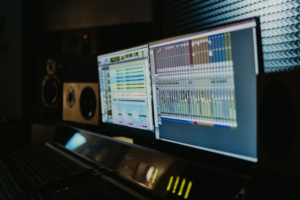
The journey from a rough demo to a polished master is transformative in the world of music production. It’s a path filled with creative challenges, technical intricacies, and the pursuit of sonic perfection.
Whether you’re a budding musician or a seasoned producer, understanding and mastering each stage of the music production process is essential for bringing your musical visions to life.
In this blog, we’ll embark on this musical journey together, exploring different music production tips to refine your tracks to professional quality.
The Demo Stage
The music production journey often begins with a simple demo. This is where your creative ideas take shape, and you start sketching out the core elements of your song. It’s a canvas for experimentation, where you can freely explore melodies, harmonies, and arrangements. During this stage, don’t worry too much about perfection; focus on capturing the essence of your musical concept.
Pre-Production
Once your demo feels promising, it’s time to enter the pre-production phase. Here, you’ll fine-tune your song’s structure, instrumentation, and overall direction. Pre-production is also an excellent time to consider the mood and tone you want to convey. Collaborate with others, if possible, to gain fresh perspectives and ideas.
Tracking and Recording
In the tracking and recording phase, you capture the actual performances that will make up your song. This is a crucial step, and the quality of your recordings will significantly impact the final product. Pay attention to mic placement, room acoustics, and the performance itself. The goal is to capture the best possible takes to work with in the next stages.
Arranging and Editing
With your recordings in hand, it’s time to refine the arrangement and edit your tracks. This involves cleaning up imperfections, aligning timing issues, and ensuring each instrument and vocal sits well in the mix. Attention to detail during this stage can make a world of difference in the final outcome.

Mixing
In the mixing stage, your individual tracks come together to create a cohesive sonic landscape. It involves balancing levels, panning, EQ, and applying various effects like reverb and compression. Mixing requires both technical expertise and artistic intuition, as it’s the phase where your song truly comes to life.
Mastering
Mastering is the final touch in the music production journey. It involves preparing the mix for distribution by ensuring consistency in volume and enhancing overall clarity and punch. A skilled mastering engineer can make your song sound best on various playback systems.
Feedback and Revision
Throughout the entire journey, be open to feedback. Collaborate with others and seek opinions from trusted individuals. Sometimes, fresh ears can spot areas for improvement that you might have missed. Don’t hesitate to revise and refine your work based on constructive feedback.
The Art of Patience
Remember that the music production journey is also a lesson in patience. It’s easy to rush through stages, but ensuring each phase is well-executed can lead to a more satisfying end result. In conclusion, navigating the music production journey from demo to master is a transformative experience filled with creative highs and technical challenges. This is primarily why reliable music studio services are necessary. Head over to Eclipse Studios for a great experience. As one of Daytona’s best recording studios, we offer a lot of help, including mixing and mastering services.
Get in touch for more information.
